The latest episode of Star Trek: Strange New Worlds, “Under the Cloak of War,” was directed by Jeff Byrd, who has directed for the franchise before with the fourth season Discovery episode “Rosetta.” Byrd began his decades-long career as a protégé of Spike Lee, working as an intern and in the camera department on films like Mo’ Better Blues and Malcolm X and eventually moving up to directing music videos in the ’90s, then transitioning to feature films and television in 2000. He is a co-executive producer on the critically acclaimed Showtime series Yellowjackets but still keeps his hand in directing for other shows. TrekMovie had a chance to talk to Byrd about taking on this different kind of Star Trek episode.
This isn’t your first time with Trek, but it was a very different episode. Can you talk about any special prep you did?
Oh, I did all this special prep this time around. Strange New Worlds is so different than Discovery. I did special prep for Discovery, but for this one, it was a whole different one, especially since this was the dark episode. I love that this version was so dark and we’re able to really dig into what it’s like to have a Starfleet black ops team that goes out like SEAL Team Six and does some dirty deeds and then to know that M’Benga was part of it. And when I say dirty deeds, I mean dirty deeds for a good cause. Some people sometimes have to be taken out for fear of what they would do to the rest of the world, or, in this case, the galaxy. Of course, I did a lot of AR wall research prepping, but really it was about what black ops teams do, what is their mandate when they go out to take out a threat, and how they feel afterward. How they feel after when they come home, much like M’Benga having PTSD because you took a life. You took lives because you had to – because it was for the betterment of the world, but it still weighs on a human soul. And that’s what we see in this episode with a M’Benga.
When I talked to Jess [Bush] and Babs [Olusanmokun] before the season started they talked about this episode as a favorite and Jess praised you as a reason it worked because you were able to get them into such emotional places. Can you talk about how you got them into these vulnerable places?
Well, first of all, I love Jess Bush. She is amazing. She’s probably praising me because I praise her every chance I get. I think she’s the future and we are going to see a lot more of her in the world, in features and other things. But the reason why she was talking the way she did is because we all immersed ourselves. Myself, Babs, and Jess really immersed ourselves in what differently they can do as their characters. What differently can Chapel do? What differently can M’Benga do? And the beauty of it is, I think you hit upon, is it is so different than the rest of the show that they’re now able to go, “Okay, I can do some different things here. I can react a different way because I’m brand new.” We see Nurse Chapel fresh off the boat, beaming down into a war zone, and then being introduced to M’Benga. And “Who’s that guy?” telling her to do things and some things that are a little unethical, like saving a soldier inside the transporter.
It’s a part of triage which is also a lot of the research that they did. They did great research and would bring it back to me, and I would go “That’s great, let’s do that.” So you have that moment when you’ve got to clear him out of the transporter memory, that’s a part of triage, and that weighs on you when you have to leave someone to die because you cannot help them in a warzone. So any praise she gives to me and Babs gives to me, I give right back to them because they brought a lot to the table. They would show up on set every day with their phone and show me things they researched and say, “Can I do this thing, Jeff?” And Davy Perez the writer was amazing and would also co-sign that stuff with me. So me and the actors would try stuff and it was a great environment for them to try new things.
You mentioned research for this episode. Were there specific war movies or maybe Star Trek episodes you looked to for inspiration?
It’s interesting you bring that up because Davy Perez definitely looked at an OG Star Trek episode, and a Deep Space Nine episode…
I am going to guess for DS9 it was “The Siege of AR-558”
Yes!
For The Original Series, I would guess the Vietnam War allegory “A Private Little War.”
Yes, the one where they are selling the weapons and keep upgrading. So a lot of those were brought into this script-wise and then realized by me on set visually. Obviously, there are comparisons in here to Apocalypse Now and there is a little Hamburger Hill in there, and even some Born on the Fourth of July. We discussed on set a lot of little easter eggs in there if you if you’re looking really closely at certain little moments. We wanted to make sure that we got some iconic moments and framing and different things of these iconic war films so that it feels familiar but it’s in a different time, obviously the future. We wanted to make sure you felt a little bit of it but were like, Oh yeah, but this is Star Trek so there is going to be a different twist to it, which of course there was.
This episode has fans talking about the moral gray areas and questionable actions, which brings up other episodes like “In the Pale Moonlight.” People still debate if Janeway is a murderer from “Tuvix.” So for this, what is the audience to take away from M’Benga’s choices, and those of Chapel as well?
The message there and what happened in there, it’s really about trust. How much does Captain Pike trust what Chapel is saying and what M’Benga is saying? It’s about the trust of your allies and your friends. And then in the back of your mind, you’ve got to think: are they lying to me? Just like you said about Captain Janeway. Was it self-defense? Was it not self-defense here for M’Benga? and is Chapel lying about it all? How much does she know? So now you have to either trust me and move on, or put me in the brig.
Can you talk about the choice to shoot Rah’s death scene with the opaque glass?
When we shot that scene, there were versions that we shot that I actually shot the fight scene in there and the death of Rah. I just wanted to make sure we had enough different versions so that when the executive producers saw it, they could pick what was best for our audience and our hearts. My whole goal in this episode was to immerse people in that world. And that’s why there are so many close-ups. I wanted to immerse people, so it’s not like your average Star Trek episode where we have the big vistas and the planet over there. We have some of those shots in there, but it’s really about getting in the heads M’Benga and Chapel and Rah. And to make it feel a little claustrophobic. It’s that tension building, I want out of here, I want out of the thing, but can’t get out. You can’t escape it. You’re here with us and figure out what you’re going to do in the end. Would you have killed him? Would you have done what was obviously done?
Speaking of Rah, it was great to see Robert Wisdom, I’ve been a fan since The Wire. Rah was a very different kind of Klingon. He kept us guessing about his motivations. Was that you, Robert, Davy? What are we supposed to take away, was Rah genuinely reformed or just a coward and opportunist?
I love that you asked that because that’s on purpose. I’ll give you the inside baseball stuff. The great Bob Wisdom, in his heart Rah had changed but Rah has obviously leanings towards his own life. But in his heart of hearts, Rah had changed, but also really wanted an ally in M’Benga. I think he saw in his mind, “This will help me get retribution for all the terrible stuff I’ve done and if I can get some Starfleet allies, that would be great, but still, I have a little bit in me of the Butcher of J’Gal.” For me and Davy when we were crafting it, my version was Rah was a little bit of a sellout in that regard. But he’s a sellout for the right reasons, meaning “I see what the damage my Klingon culture has done and I want to at least make amends to the bad side of it that has affected me and all the people I’ve killed in that regard.” So it was a little bit of that in there from me in my direction of Mr. Wisdom, and the way certain things were kind of manipulated in that way. And for Davy, it was all things. All things can be encompassed in one thing and in one being, which I love that too. I love the fact that everything is not all bad, everything is not all good.
New episodes from season 2 of Strange New Worlds drop weekly on Thursdays on Paramount+ in the U.S, the U.K., Australia, Latin America, Brazil, France, Italy, Germany, Switzerland and Austria. Season 2 is also available on SkyShowtime elsewhere in Europe. The second season will also be available to stream on Paramount+ in South Korea, with premiere dates to be announced at a later date.
Keep up with news about the Star Trek Universe at TrekMovie.com.

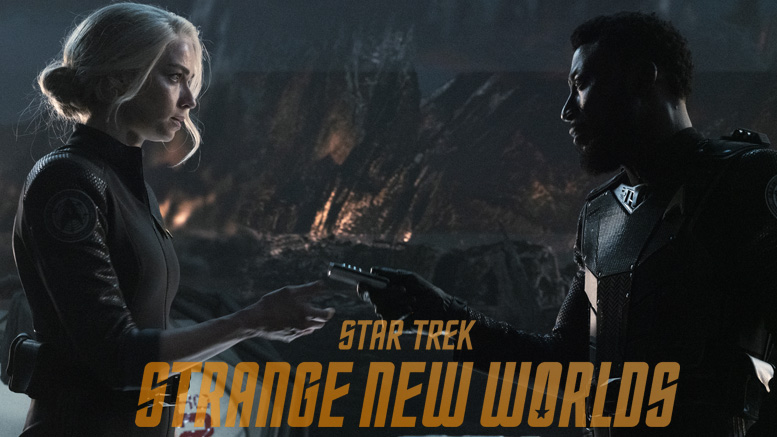
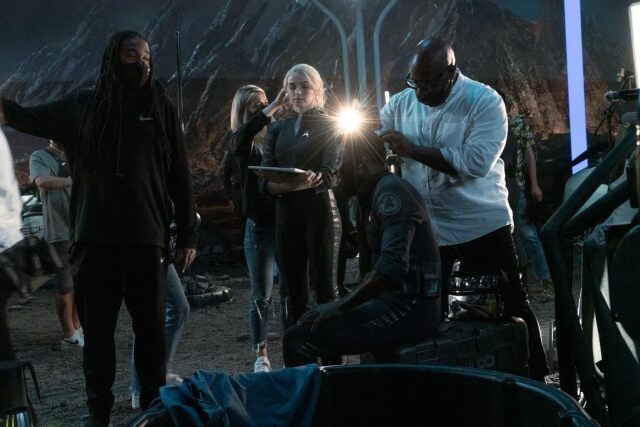

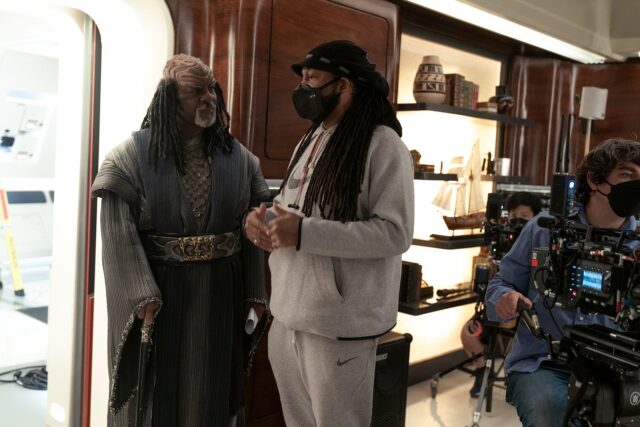
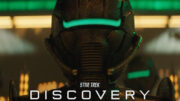
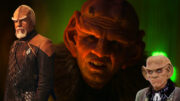
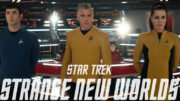

Wonder if he took a look at TUC …
Robert Wisdom’s character does have some similarities to Gorkon, so that would be a logical place to look for visual and character inspiration.
RIP David Warner!
An interesting interview but it didn’t really address the ethical question that the writers set up in this episode. Namely, what about M’Benga’s deciding to become an extra-legal executioner after the war was well over? The situation reminds me of Simon Wiesenthal’s “The Sunflower” in which a Holocaust survivor refuses to comply with a request for forgiveness from an elderly and dying Nazi camp guard. Here M’Benga is unable to consider forgiving Rah. Ok, that’s understandable. But then he assumes the role of jury and judge and imposes a peacetime summary execution because Rah is, what, shown to be duplicitous? A war crimes tribunal is the proper forum to address Rah’s deeds during the war, not M’Benga postwar in his earlier role as a ghost. His trauma doesn’t excuse his decision. And Pike as a character ( a “Boy Scout”) is weakened by overlooking such questions. Can he trust M’Benga in any remotely similar situation? Unless, of course, these issues re-emerge in E10, which is likely to feature a Gorn attack of some sort.
extra-legal executioner. Do you mean, A MURDERER?
I think the phrase ‘extra-legal executioner’ very accurately represents M’s thoughts or rationalized feelings (and indeed, all of Elrond’s post is very solid.)
Re: Pike. He’s getting problematic. I always like the ‘wearing command like a comfortable old jacket’ notion that Shatner once evinced, but you gotta show the iron behind that relaxed ‘tude when it is called for, otherwise it makes you just seem complacent or incompetent. They’ve done damage to the character and unless ep10 is a revelatory Pike showcase (on the order of TOS’ CITY or DS9’s PALE MOONLIGHT), this whole season will have been a huge step back for him.
Yes, totally agreed about how Pike has been written this season. Very disappointing, and does the talents of Anson Mount very little justice.
Could be addressed in the musical. The Buffy musical had songs that talked about their inner thoughts. Buffy saying she was in hell ect. Thought it was an interesting take.
Why, thanks, for the kind word, Kmart!
Let me add another thought or two based on the 16 posts currently online. First, it doesn’t matter one iota to the ethics (or legality) of M’Benga’s actions if Rah was sincere or not in his expressed desire to bring peace between Klingons and the Federation. M’Benga is not competent to determine Rah’s sincerity based on his subjective impressions, nor is he authorized to impose capital punishment for duplicity. I meant to add yesterday that the title “Under the Cover of War” could apply directly to M’Benga: he used the cloak of war to mask Rah’s death.
Second, there is certainly ambiguity in the presentation of the final, fatal encounter in terms of the question of whether M’Benga acted in self-defense. All of the circumstantial evidence suggests to me that he did not. E.g., it’s noteworthy that neither Chapel nor M’Benga himself assert self-defense. (And it appears that Chapel might have had the same obscured view as the episode’s viewers, despite telling Pike that she was there and saw everything.) And Pike (oddly) doesn’t directly ask about self-defense question. One wonders what the inquiry Pike mentions is actually going to investigate. I hope we find out and the show doesn’t just move on.
Frankly, M’Benga was put in an impossible situation. The way I see it, this is all Pike’s fault for putting a person with PTSD in contact with the person that caused it and asking him to be diplomatic about it. Pike wasn’t in the War, he has no right to judge. Even in the real world I bet anything that this would be innocent by reasonable insanity or whatever you call it.
I finally finished watching “Under the Cloak of War” tonight. (Superb episode, BTW.) I’m not convinced M’Benga did the killing. I think the best interpretation (and I love the ambiguity) is that Rah committed suicide, and that he announced his intention to do so when he asked M’Benga to “let me help you heal.”
The evidence?
1. They explicitly did *not* show M’Benga picking up the knife before cutting to the opaque glass scene.
2. During the scuffle, Rah asks, “don’t you see it”? That line makes no sense if M’Benga is pointing a knife at Rah. But it makes a lot of sense if Rah surreptitiously picked up the knife. That scenario also is consistent with M’Benga’s next line, “get your hands off!” Everyone is thinking that means “get your hands off me”; but it may mean “get your hands off my war-trophy knife!”
3. Rah replies, “so selfish a human.” My first reaction to someone pointing a knife at me would not be to call that person selfish. But if Rah, in a moment of atoning for his cowardice and dishonor, is about to commit seppuku, it makes perfect sense to call M’Benga selfish to trying to stop the seppuku. If M’Benga succeeded, it would rob Rah of the latter’s chance to restore his honor.
4. M’Benga then cries, “don’t!” As in, “don’t stab yourself.”
5. When they show Rah lying on the floor, his hand slumps to the floor, starting roughly from the area where the knife handle is. It could, of course, be that he touched the knife after M’Benga thrust it; but it could also be that Rah was wielding the knife himself.
6. La’An says she “tracked the movements,” meaning she probably looked into the forensics of what happened.
7. Later, M’Benga says, “I told you, I didn’t start the fight. But I’m glad he’s dead.”
The trouble with all the ambiguity generated by Rah and the conclusion of the episode is that the episode ends up not saying anything about its themes. It’s all very surface level, as with a lot of this show. I commend the producers for doing a horrors of war episode, but for me, this was a complete misfire on every level. Such an episode should never be dull- and this was the definition of that.
It strikes me that the producers are being influenced by fan backlash from fans like ML31 who say old trek let you make up your own mind (those fans are wrong btw).
Given narrow minded audiences like that, perhaps today they’d rather play ambiguous than make a definitive statement.
That said, sometimes ambiguous is ok. I liked this episode quite a bit. And while it didn’t make the definitive statement, it did create an interesting character development for the future.
I suspect this could wind up the reason M’Benga is demoted.
👆🏻👆🏻👆🏻👆🏻
I sometimes think the writers are getting their ideas and scripts from A.W.E.S.O.M.-O 4000.
So long as they don’t get them from Colossus, HAL 9000 or Skynet. (time to rewatch THE FORBIN PROJECT — while there still is time!)
The director’s basic job is to provide enough material and choices for the editors to work with, so it makes sense the fight was shot in different ways. The rest of the interview implies to me that they had M’Benga start the fight if the POV on set was that Rah was really changed. But the edit we got had that semi-awkward ambiguity.
It also sounds like Byrd has never seen Tuvix, but that’s ok. ;)
I’m glad to get confirmation about what Rah was doing, that he really had changed.
I’ve seen some fans say that M’Benga obviously murdered Rah, and other fans saying that Rah obviously attacked M’Benga, and he only defended himself. TrekMovie, did you get — or can you get — any confirmation about what truly happened in the fight scene?
I am not sure we are supposed to get a confirmation of who started the fight. I think the episode is supposed to be ambiguous and I rather like it that way. I think knowing destroys the very debates that this episode created. I am also not sure Rah truly changed but then again maybe I would feel differently if there had been more story to work with. Same with Pike’s actions in this episode. He started off just accepting what the Federation told him and it didn’t work out. It would have been nice to have seen more of his evolution on the issue and him coming up with more solutions to deal with the peace going forward. Then again maybe his actions were also supposed to be ambiguous? No easy solutions for how make peace with your enemies! Ultimately this was an episode that could have ran for longer while Tomorrow, Tomorrow, and Tomorrow was one that could have ran shorter. Strange no one thought that this backstory was worth exploring in more depth.
Oh well, I thought everyone did great with the material given. Especially Babs and Jess. Babs deserves more screen time and Jess deserves to be more than a love interest. Hopefully we continue to explore this aspect of our characters including Ortegas. She definitely deserves her own episode!
TrekMovie explicitly ASKED whether or not Rah had reformed, and the director answered that question. I thought Rah’s motivations were supposed to be ambiguous, too, but the director says not.
The director also said that he filmed the fight without the glass in the way, so everyone could see exactly what happened. So I thought he might want us to know what truly happened there, as well.
I’ve been loving M’Benga up till now, but if he turns out to be a murderer — even with his understandable motivation — that will change my opinion of the character.
For the director’s perspective he reformed but from what I saw he didn’t! I thought he was still the same person but one who adapted to survive. That’s not the same thing! Underneath it all he still committed atrocities and he still lied about his responsibilities in regards to them. He blamed his soldiers but he was the one who gave the orders. M’Benga even asked him to leave at one point because he was bothering him but Rah chose to stay. Maybe I would have felt differently IF the story supported it but it didn’t. This is where the longer run time would have helped out. We might have seen more evidence on screen of how he evolved. It might have made the character’s actions seem more sincere. Unfortunately we just get the statement from a behind the scenes interview. One I liked though!
As for people’s opinions of M’Benga…they will now be diverse. I think it’s a good thing! There should be some ambiguity in regards to characters on tv shows. Makes it more interesting. I don’t need to know entirely what happened in regards to that so even if the director reveals it I hope it doesn’t get around too much! Or I can just keep my own head cannon ;) The situation reminds me a bit of the character of Garak from DS9. Who was he really…not a plain and simple tailor. But was he an assassin? And how did he get exiled? Who knows we never got the answers. I liked that they left up it to the viewer!
Greedo shot first. ; )
Nah, it was Han. :-)
Snoopy fired once, then he fired twice, and that bloody red baron went spinnin’ out of sight. (if you’re gonna jump franchises, jump big.)
M’Benga looks at the camera as Rah’s body falls to the ground. “Did I do that?” he squeaks.
Han CLEARLY shot first Stop trying to say he stared as a pure hero!!!
Dr M is clearly a Murderer , he lies to cover it up .As a “doctor” he does nothing for his victim in Sick Bay ,with super genius Capple present .
Its funny how people are trying to say the general attacked M ,like he knew M had the trophy knife in a box at the ready .
The whole Dr M going off to kill the General because he ordered his men to attack civilians justification falls flat when the very episode starts and they Show those Kling orcs.
Emperor Kling orc said the Humans /Federation were an existential threat to the empire and ordered them wiped out .
Every Klingon was part of the slaughter of 3/4 the fleet ,numerous bases and worlds as they approached Earth ,they weren’t playing by any rules at all during the war .
Pike has become a Joke , all he is is cook .
Way to familiar with his crew and it shows the old adage correct ” familiarity breeds contempt”
Imagine what Kirk Picard ,Sisko ,Archer or Janeway would do with the grumbling crew about the ambassador ,….they would all do a variation of ” You are Starfleet Officers and will conduct yourselves as such or be confined to quarters for the duration of the mission ! ”
They would also not let Dr M off the hook at the very minimum write him up for dereliction of duty as CMO by doing nothing to save the ambassador life . They would also know they are being lied too and not let it go.
Star Trek is no stranger to controversial storylines where the motto can best be summarized as…the ends justify the means! As a result I am not sure that would have been Sisko’s response due to his actions in the episode In The Pale Moonlight….among other examples. Sisko was no stranger to moral ambiguity and using it when he needed too. Archer on the other hand stole a warp core and confined a crew to a long and dangerous journey home! Why because to him his crew’s success mattered more. Janeway killed Tuvix! Why because she needed Tuvok.
Picard is probably the only one that I think would have been appalled but I think he would have understood way more that what Pike appeared to. I also think that Pike’s actions in this episode was colored by his own experiences with the Klingons. Those experiences have been mostly peaceful while the war veterans have mostly been filled with death. Makes sense there is a divide they don’t know how to cross. Just didn’t think it came across well on screeen. Not enough story there.
True but Sisko’s intent was not to kill, it was to save millions and the Quadrant DURING THE WAR .As for Archer he was at WAR with the Zindi trying to save HIS ENTIRE RACE .Janeway is a flat out killer . Picard at least but a bad eval in Worf’s file .
Oh I don’t disagree with those Captain’s decisions. If anything I like that they prompt so much discussion! As for Picard…a bad eval hardly mattered to Worf’s career. He got multiple bad evals including one from Sisko when he saved Jadzia and let a defector die. He still became an ambassador and a captain! But to your point something was better than nothing. But what proof does Pike have? Chapel defended M’Benga. La’An said the timeline fit. Can’t convict with no evidence.
I frankly don’t think Pike wanted to move forward with a conviction. IMHO the death was not Dr M’s fault, it was Pikes. Dr M should never have been put in that position, Starfleet personel or not. Just Like Kirk should never have been assigned to make peace with the Klingons in ST VI
Picard murdered a recently assimilated crewman begging him for help. Great moment under extenuating circumstances, but it’s up there with Data trying to execute Kivas Fajo when it comes to complicated things to unpack.
great examples! Data was the most shocking, It should have been totally against his programming but maybe showed he was finally growing beyong the programming
Kirk killed Krudge. Understandable by him having it up to here but still, he was on the cliff and Krudge was falling off, he could have saved him.
I wondered if they toyed with calling it ‘first, do no harm.’ Then again, that might have been gilding the lily.
Definitely but I do like your reference. However, I like Under the Cloak of War better due to the references the episode gave to M’Benga’s past. He had been a special forces soldier. He then tried to leave all of that behind to become a doctor. Only to find himself back in a warzone. I also liked how it tried to raise questions about how war changes people. Hell if M’Benga had only ever been a doctor and never experienced war maybe he would view his own actions differently? Then the motto ‘first, do no harm’ might truly have had a different meaning to him and Chapel! She wasn’t exactly stopping him from going!
Has anybody on the writing staff talked about the initial pitch for this ep? I keep thinking it could have been, ‘what if McCoy deliberately let Gorkon die in TUC? It’d be fitting given angry McCoy’s ‘tude about ‘Klingon butchers’ in DAY OF THE DOVE (even if that was influenced by the evil pinwheel, which I sometimes think of as the WOLF IN THE FOLD ripper after a year in vacuum.)
TOS dropped little breadcrumbs back in the day that Klingons were very horrific in combat. Unfortunately, episodic TV, and the delicate sensibilities of the standards boards back on the day would never have allowed that to be explored. It was a lot easier to drop in supreme beings that told the kids to stop fighting.
“art consists in limitations”
The worst thing IMHO the Klingons ever did in TOS was to arm a pre-WARP society with weapons that were way beyond their means just to get ore or something like that. And Kirk had to do the opposite to the opposite side to even things out. Kirk broke the Prime Directive but in hindsight he didn’t have much of a choice. Unlike the TNG ep with the De-Aging Admiral, Kirk did not arm both sides and escalate a war. He tried to make things as even as possible.
I honestly don’t think that is sometthing McCoy would have done. He more than anyone else on Trek ever embodies the Hippocratic Oath with do no harm. And Gorkon was not a bad Klingon, it was Chang that was the issue. Gorkon even died saying, “don’t let it end this way, Captain!”
This comment was posted accidentally.
This comment was posted purposefully.
And this comment was just right.
It will be interesting to see how SNW continues to deal with the Klingons. Are they going to completely ignore the sewer rat Klingon makeover from Discovery season one? It seems like they are headed in that direction, which in fairness was already done pretty much in Discovery season 2.
I just wish they didn’t kill him because he was an interesting character.
He is a tremendous actor, not just in THE WIRE but also in one ep of BOOMTOWN and part of KINGPIN miniseries. I just don’t think they gave him enough to make it really work, but if anybody could, it would have been him, so kudos on the casting, the only thing (outside of the previous week’s ep) that I’ve been much impressed with.
I do have to say that his klingon head piece had a shine or finish that was very distracting, on the Berman era level of terrible old-age makeup unconvincing. So once again, production values are a letdown for me (but couldn’t complain too much about space exteriors, as there were very few. Where DOES the money all go?)
I have been wondering if the makeup was simplified to allow his acting to come through more? Not every actor is successful when dealing with lots of prosthetics.
The question about how the show spends the money it receives is very interesting. I never could have imagined missing the bottle episodes of the 90s. Then I got older and realized they had some fantastic character moments. I wish the new streaming Star Trek shows would embrace them a little more. Also the A, B, C storylines. Overall SNW has been better for me in the second half of season 2 vs. the first half. The storylines seem more layered even if they don’t always work out for every viewer. Myself included!
I’m not usually a post the origin of the episode name sort of person BUT i haven’t seen anyone really talk about this one
“It is my conviction that killing under the cloak of war is nothing but an act of murder.”
Einsten, Mein Weltbild (My World-view) (1931)
I really need to get to see Oppenheimer for many reasons, but one is to see how it deals with Einstein’s pacifism.
Interesting quote. Not sure I agree. To me killing in combat is different than murder. But I get it nonetheless. Saw Oppenheimer and loved it…..no spoilers so let’s just say the Einstein scenes are very brief.
I feel this had more in common with ‘Nor the Battle to the Strong’ then AR-558.
Also had hints of:
The Wounded
Duet
It’s Only a Paper Moon
Nothing Human
Cease Fire
“Jetrel” as well.